 MyDogBreeds
MyDogBreeds Japanese Chin is originated from Japan but Chinese Chongqing Dog is originated from China. Japanese Chin may grow 21 cm / 8 inches shorter than Chinese Chongqing Dog. Japanese Chin may weigh 18 kg / 39 pounds lesser than Chinese Chongqing Dog. Both Japanese Chin and Chinese Chongqing Dog has almost same life span. Both Japanese Chin and Chinese Chongqing Dog has almost same litter size. Japanese Chin requires Moderate maintenance. But Chinese Chongqing Dog requires Low maintenance
Japanese Chin is originated from Japan but Chinese Chongqing Dog is originated from China. Japanese Chin may grow 21 cm / 8 inches shorter than Chinese Chongqing Dog. Japanese Chin may weigh 18 kg / 39 pounds lesser than Chinese Chongqing Dog. Both Japanese Chin and Chinese Chongqing Dog has almost same life span. Both Japanese Chin and Chinese Chongqing Dog has almost same litter size. Japanese Chin requires Moderate maintenance. But Chinese Chongqing Dog requires Low maintenance
 The Japanese Chin, also known as the Japanese Spaniel, has always been known for thousands of years as a dog with strong companion characteristics.
The Japanese Chin, also known as the Japanese Spaniel, has always been known for thousands of years as a dog with strong companion characteristics.
Hailing from Asia, he is also known as the Japanese Spaniel. In Japan, the Chin dogs are royalty and lapdogs, and while the exact origin of the Japanese Chin isn't quite clear, it is an ancient toy breed.
The first Japanese Chin was brought to America in 1882. The toy breed was recognized by the American Kennel Club in 1888, as a Japanese Spaniel. The AKC changed the breed name to the Japanese Chin in 1977.
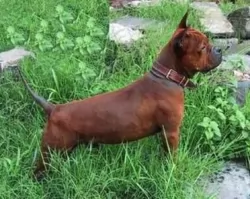 The Chinese Chongquing Dog is a very rare and unusual breed found only in China and now in Canada. The Chongquing is native to the city of Chongquing, China. This is an ancient breed that is believed to have lived in China over 2000 years ago during the Han Dynasty. It was a hunter and protector and still functions in those roles today., although there are very few left in China. Following the revolution and creation of the People’s Republic of China, the CQ Dog was only found in the rural areas of the country.
The Chinese Chongquing Dog is a very rare and unusual breed found only in China and now in Canada. The Chongquing is native to the city of Chongquing, China. This is an ancient breed that is believed to have lived in China over 2000 years ago during the Han Dynasty. It was a hunter and protector and still functions in those roles today., although there are very few left in China. Following the revolution and creation of the People’s Republic of China, the CQ Dog was only found in the rural areas of the country.
Pottery versions of the Chongquing Dog and burial figurines have been found in excavation sites from tombs of the Han Dynasty. In this isolated and mountainous area of eastern China, the dogs were unknown throughout the rest of China. Because of this the breed is relatively untouched by human intervention and is today about the same as it was 2000 years ago. There has been no interbreeding to change the natural evolution of the breed. They have their own unique personalities and temperaments.
At this time, it is believed that the Chongquing Dog is more endangered and rarer than the panda. Current breeding is diluting the breed as there are so few true bloods cross breeding and inbreeding is occurring. The knowledge of the exact breeds that contributed to the original Chongquing Dog was lost ages ago. The CQ Dog is known for loyalty, noble character, bravery and protecting its own. Today there is one kennel breeding these dogs outside China in Canada.
 As a small sized dog, the oriental looking Japanese Chin stands at about 20 to 27cm in height and weighs roughly 2 to 6kg. He has a large round head with big brown eyes and a short muzzle. The ears are long and feathery and the tail is long and held up over the back.
As a small sized dog, the oriental looking Japanese Chin stands at about 20 to 27cm in height and weighs roughly 2 to 6kg. He has a large round head with big brown eyes and a short muzzle. The ears are long and feathery and the tail is long and held up over the back.
The long silky single coat is either white and red or white and black or it can be tri-colored too – white, black and reddish-tan.
The Japanese Chin is a small, evenly tempered dog and the toy-size dog, according to people who have owned him as a pet, say he has some cat-like features – the ability to leap and the ability to wash himself similar to what a cat does.
He is also a typical lap dog liking nothing more than to lie in your lap and be petted. He just loves being with his human family and his smallness allows him to fit well into city- or country life.
He is an intelligent dog. He is small but strong-willed and that is why both you and him will benefit from having him trained and socialized as he becomes more amicable and obedient.
Social, jaunty and content, he is everyone’s friend and will be a suitable playmate for children, being loving and devoted to his entire family. They make great therapy dogs as he has the knack of being sensitive to the feelings of people and adjusts his mannerisms to suit the people he is with.
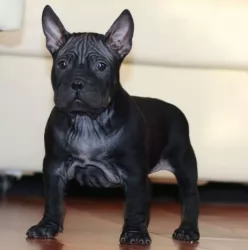 This breed is not well known, even in China. However, its likeness has been found in pottery dating back to the Han Dynasty. It is now beginning to be show in select dog shows. The general appearance upon which a current standard is being developed includes:
This breed is not well known, even in China. However, its likeness has been found in pottery dating back to the Han Dynasty. It is now beginning to be show in select dog shows. The general appearance upon which a current standard is being developed includes:
The Chongquing is a medium sized, compact and square dog that is powerful, muscular and strong. He is unique in appearance, tail and coat. His head is large, broad and flat. There are wrinkles from the muzzle to the forehead between his eyes. His eyes are brown, and the rims are black. He has high set, small ears that are triangle shape. Its frame is sturdy and strong. He is very muscular, and his strength and speed are explosive.
The Chongqing Dog can be one of three sizes: small, medium and large. All are hunters, but each hunted different prey. The appearance of all three sizes are proportionally the same.
 The Japanese Chin is just longing to be your special friend. When you treat him with the love and care he deserves, you'll discover that he is a sweet, gentle companion who will be loyal and loving to his human family.
The Japanese Chin is just longing to be your special friend. When you treat him with the love and care he deserves, you'll discover that he is a sweet, gentle companion who will be loyal and loving to his human family.
He is a quiet pet and intelligent enough to be trained and socialized so that he is obedient and ready to please. Although he doesn't bark much, he makes quite a few other noises such as wheezing, snorting and snorting. He makes up for it by being entertaining and loving towards you so that you life is brighter just by having him in it.
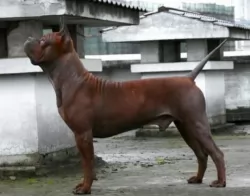 The Chongqing Dog is a confident, passionate, fearless and loyal dog. He is brave, alert, thoughtful and elegant. They make good companions for their people, but they are very wary of strangers and are ready to attack in order to protect their people. They are affectionate and loving with their people, including older children. They should never be off-leash in the company of other dogs.
The Chongqing Dog is a confident, passionate, fearless and loyal dog. He is brave, alert, thoughtful and elegant. They make good companions for their people, but they are very wary of strangers and are ready to attack in order to protect their people. They are affectionate and loving with their people, including older children. They should never be off-leash in the company of other dogs.
 There are a few health issues with your Japanese Chin that are worth knowing about such as hypoglycemia, cataracts and heart murmurs. Allergies and dental issues also need to be checked.
There are a few health issues with your Japanese Chin that are worth knowing about such as hypoglycemia, cataracts and heart murmurs. Allergies and dental issues also need to be checked.
Dog breeds with the flattened face always battle with dental-, eye and breathing problems. With good care however, your Japanese Chin can reach anything from 10 – 12 years of age.
Murmurs come about because of a disturbance in the blood flow and which can produce an audible noise. If your dog's murmur is associated with structural heart disease, your dog may display signs of congestive heart failure and he'll be weak for instance and be coughing.
When your dog gets to the vet, the course of treatment will be determined on the type of heart murmur. Luckily puppies with low grade murmurs often grow out of it but if you have an adult dog, routine diagnostic imaging may be recommended by your vet.
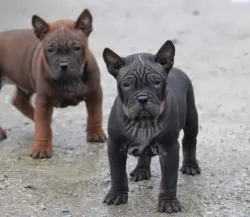 The Chinese Chongqing Dog is a very healthy breed by reason of its isolation and seclusion in the far regions of eastern China. There has been no human intervention in the natural development of this breed and no health issues have followed.
The Chinese Chongqing Dog is a very healthy breed by reason of its isolation and seclusion in the far regions of eastern China. There has been no human intervention in the natural development of this breed and no health issues have followed.
 The Japanese Chin has a single coat, and a brush once or twice a week will keep the coat silky and untangled.
The Japanese Chin has a single coat, and a brush once or twice a week will keep the coat silky and untangled.
Check his ears for dirt and wax and try to wipe inside the ears, being very, very careful not to go deep into the ear to avoid damage.
Clip his nails and brush his teeth as small dogs are more prone to dental disease. Periodontal disease is preventable with dental cleaning. Dental disease starts when plaque sticks to the surface of the teeth. It hardens, spreads under the gum line and cause tissue damage. It also damages the immune system.
The Japanese Chin is an energetic dog and loves a game and a walk. It isn't the kind of dog that you will take on your hikes or swimming as it tends to huff and puff after a while from too much exercise, and more specifically in hot weather.
Dog experts say that a grain-free food is best for this kind of dog. Kibble which comes with lean protein and with plenty of vitamins and minerals such as taurine and carnitine is recommended. They are good for the joints, coat, heart and eyes. Japanese Chins can be prone to heart- and eye problems and kibble rich in omega 3 fatty acids will be good for the Chin for many excellent reasons.
If you're in any way uncertain about what to feed your Japanese Chin, speak to your vet as the type of food you feed your pet will determine how healthy he will be. Always ensure he has access to fresh, cool water.
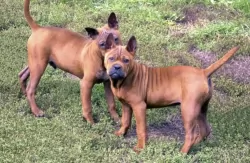 The best food for this dog is made yourself of human grade foods. Either raw or cooked yourself . This will keep their skin, teeth and coat healthy.
The best food for this dog is made yourself of human grade foods. Either raw or cooked yourself . This will keep their skin, teeth and coat healthy.
This is a really healthy breed especially due to the isolation and natural selection of their history.
He needs about 30 minutes of exercise today. He has no history of participation in canine games.